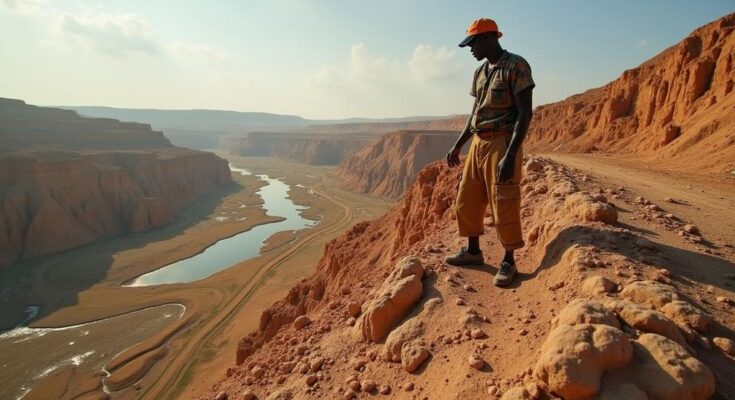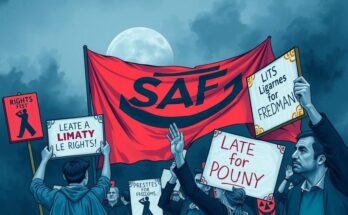A severe drought in southern Africa endangers over 6.5 million people, with urgent international aid needed. Tunisia battles human rights abuses ahead of elections, and Pakistan faces violence against mineworkers, emphasizing the necessity for accountability and respect for minority rights.
A staggering crisis unfolds in southern Africa, where an intense and historic drought, exacerbated by last year’s El Niño phenomenon, has left nearly 6.5 million people grappling with starvation. The World Food Programme (WFP) reports that over 27 million lives across nations like Lesotho, Malawi, Namibia, Zambia, and Zimbabwe have been severely disrupted, with a chilling statistic revealing 21 million malnourished children. Amidst this sea of desperation, the WFP warns that the worst is yet to come, as crop failures and livestock deaths have turned lands into barren wastelands. As the lean season begins, communities brace for the peak hunger period anticipated in January. The UN agency appeals for $369 million to alleviate suffering, yet has only secured a mere 20% of the necessary funds. Meanwhile, in Tunisia, the winds of democracy are stifled under the weight of oppression. UN rights chief Volker Türk has voiced an urgent call for the Tunisian authorities to safeguard democratic processes and uphold fundamental freedoms in light of recent crackdowns on opposition figures, independent activists, and journalists. Leading up to the presidential elections on October 6, more than 100 individuals associated with various campaigns faced arrests, leaving only three candidates accepted by the Independent High Authority for Elections. Concerns have mounted over the disregard for due process, illustrated by trials that fall short of fair trial standards. The refusal to reinstate excluded candidates, combined with laws limiting judicial authority over electoral disputes, reveals a growing trend of disrespect for the rule of law, urging swift reforms to restore respect for human rights principles. In a grim backdrop, the UN human rights office has condemned a horrific attack that claimed the lives of 20 mineworkers in Pakistan’s Balochistan province, with seven others wounded. The armed assault, said to be orchestrated by militant groups employing hand grenades and rocket launchers, adds to a history of violence intended to stoke ethnic divisions in the region. OHCHR spokesperson Thameen Al-Kheetan has called for accountability, insisting that actions must align with Pakistan’s international human rights obligations. The discussion extends to the recent ban on the Pashtun Tahaffuz Movement, prompting a call for respect for freedom of expression and the release of detained members. As these narratives unfold, the stormy intersections of drought, democracy, and human rights expose deeply woven issues globally. The stark realities faced by populations in southern Africa, Tunisia, and Pakistan highlight the urgent need for international attention and action to support the struggles against starvation, oppression, and violence. Their voices, resilient yet fragile, echo the urgent call for compassion, justice, and hope for a brighter tomorrow.
The article delves into three pressing global issues: the severe drought in southern Africa, human rights abuses in Tunisia, and the violence against mineworkers in Pakistan. The drought affects millions, causing malnutrition and hunger, while Tunisia faces a troubling political climate marked by a crackdown on dissent ahead of elections. Pakistan grapples with ethnic tensions, highlighted by a violent attack on mineworkers. Each situation reflects complex socio-political landscapes requiring international attention and intervention.
In summary, the article encapsulates urgent crises currently affecting southern Africa, Tunisia, and Pakistan. The historic drought threatens millions with starvation, necessitating substantial humanitarian aid. Concurrently, Tunisia’s democratic integrity faces challenges from political repression, while Pakistan’s mineworkers suffer violent attacks that require accountability and respect for human rights. Together, these narratives underscore the importance of collective global action to address and resolve these profound challenges.
Original Source: news.un.org



